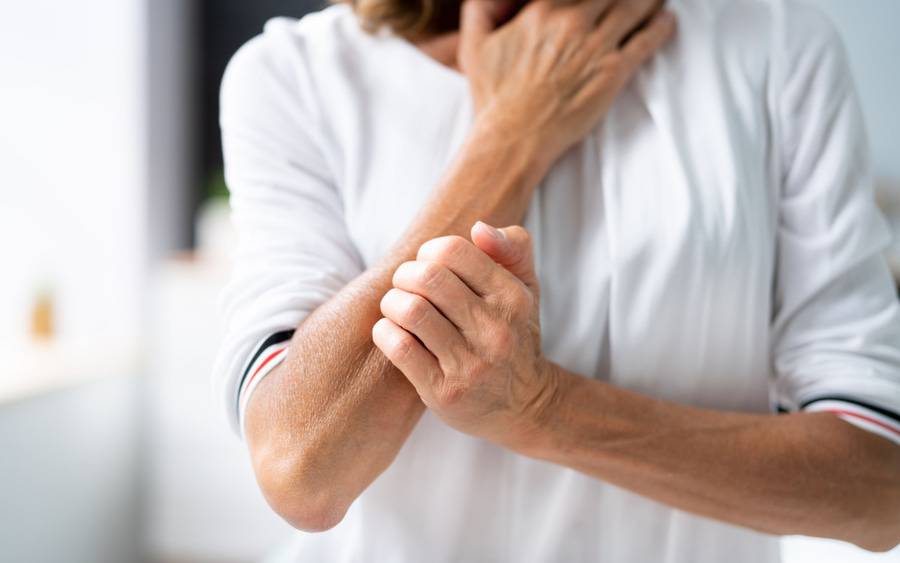Does Cancer Cause Itching?
Certain cancers and treatment side effects can do it

Certain cancers and treatment side effects can do it
Cancer can cause a wide variety of symptoms ranging from very specific to very broad. Weight loss, fatigue and loss of appetite are commonly associated with most types of cancer, but does cancer cause itching also?
“While there are a few types of cancer that may cause itching, the vast majority do not,” says Sophia Akhiyat, MD, a dermatologist at Scripps Clinic Liberty Station and Scripps Clinic Anderson Medical Pavilion in La Jolla. “Itchiness is more likely to be a side effect of cancer treatment rather than a sign or symptom of the disease.”
Here’s a look at the relationship between cancer and itchy skin.
What types of cancers cause itching?
A few types of cancer have been associated with itching:
Hodgkin lymphoma and non-Hodgkin lymphoma
These blood cancers may cause itchiness, either in a single location or throughout the body. The exact reason why is unknown, but they may release substances into the body that trigger itching. Treating the cancer usually relieves the itch.
Gastrointestinal cancers
Some types of cancers that affect the gastrointestinal system may cause obstructive jaundice, which occurs when the bile ducts are partially or completely blocked. This blockage prevents bile from draining out of the blood into the intestines.
The build-up of bile causes jaundice, which in turn causes yellowing of the skin and itchiness. Obstructive jaundice most commonly occurs with pancreatic cancer, liver cancer and gallbladder cancer.
Inflammatory breast cancer
Most types of breast cancer do not cause itching, but inflammatory breast cancer is an exception. This aggressive breast cancer, in which cancer cells invade the breast skin and lymph vessels, can cause persistent itching and a rash or skin irritation. Other symptoms include breast redness, swelling and warmth.
Melanoma
Itchy moles on the skin are considered a warning sign of this type of skin cancer.
Which cancer treatments cause itching?
Some cancer treatments can cause itching or skin rashes in specific areas or throughout the body. These include:
Chemotherapy
Patients who experience itchy skin or rash during or after chemotherapy may be allergic to one of the drugs.
Radiation therapy
Radiation therapy targets cancer cells, but if surrounding healthy cells receive radiation, itching may result.
Immunotherapy or targeted therapies
These may cause inflammation of the skin, which can trigger itchiness.
Medications
In some cases, medications used to treat nausea, pain and other side effects may cause itching.
“If you have cancer and are bothered by itchy or irritated skin, let your care team know,” says Dr. Akhiyat. “They can determine what’s causing your discomfort and help make you more comfortable.”
Help relieve the itch
Try to avoid scratching, which can break the skin and open the door for infection. You can take steps at home to soothe your skin and help relieve itching:
- Ask your cancer care team to recommend a skin cream that is safe for you. Avoid fragrance, which can irritate skin.
- Take baths and showers in warm water — hot water can dry out skin and cause more itching.
- Use a moisturizing, unscented soap and wash gently. Avoid scrubbing.
- Avoid scented products, including lotions, soaps and deodorant.
- Wear loose-fitting, comfortable clothes made of cotton. Avoid wool and synthetic fabrics that may be irritating.
- Keep skin hydrated. Drink plenty of fluids.
- Ask you care team about over-the-counter antihistamines that may help. For severe itching, your doctor may prescribe medication.
- Try massaging itchy areas or applying cool cloths to itchy skin instead of scratching.